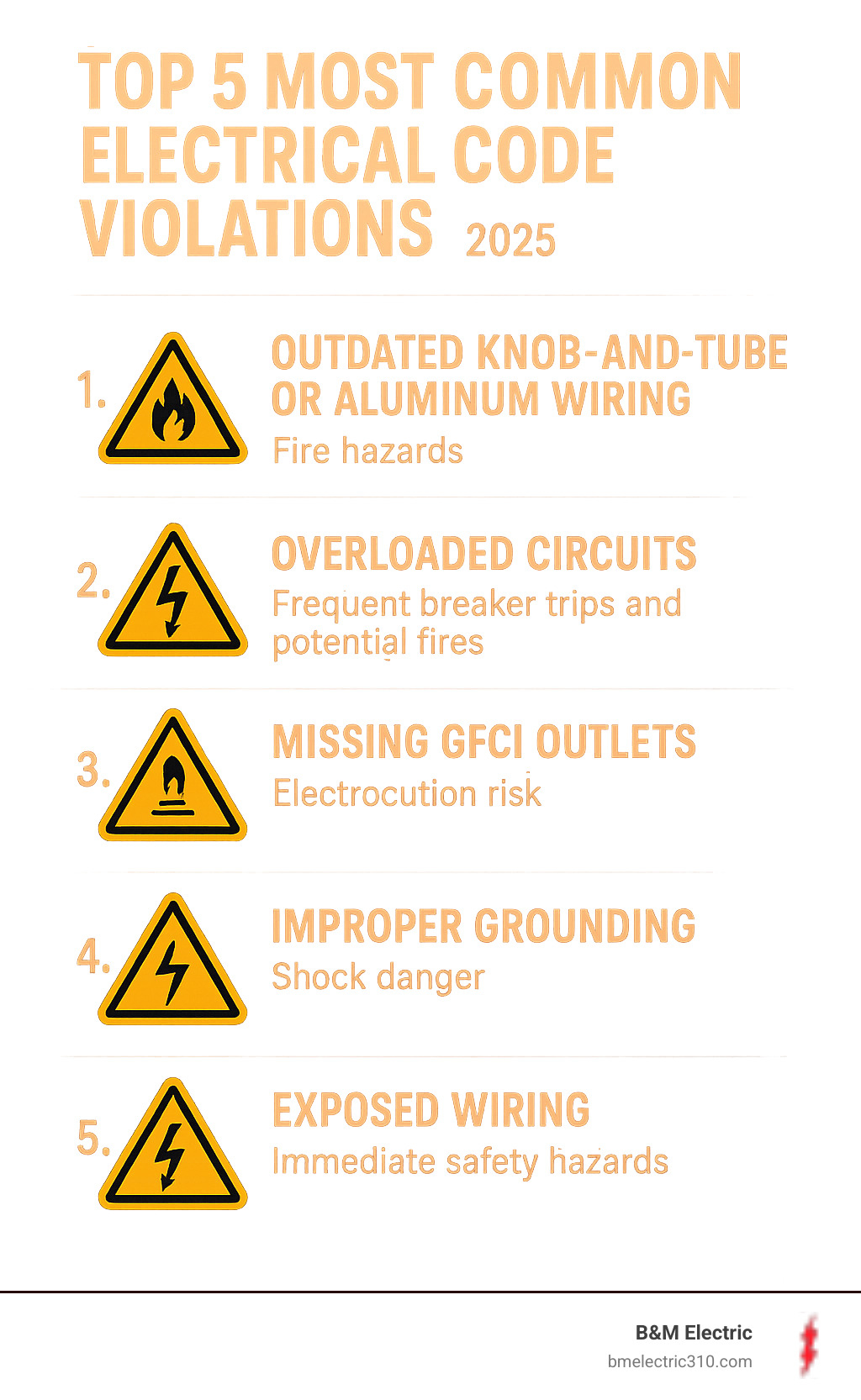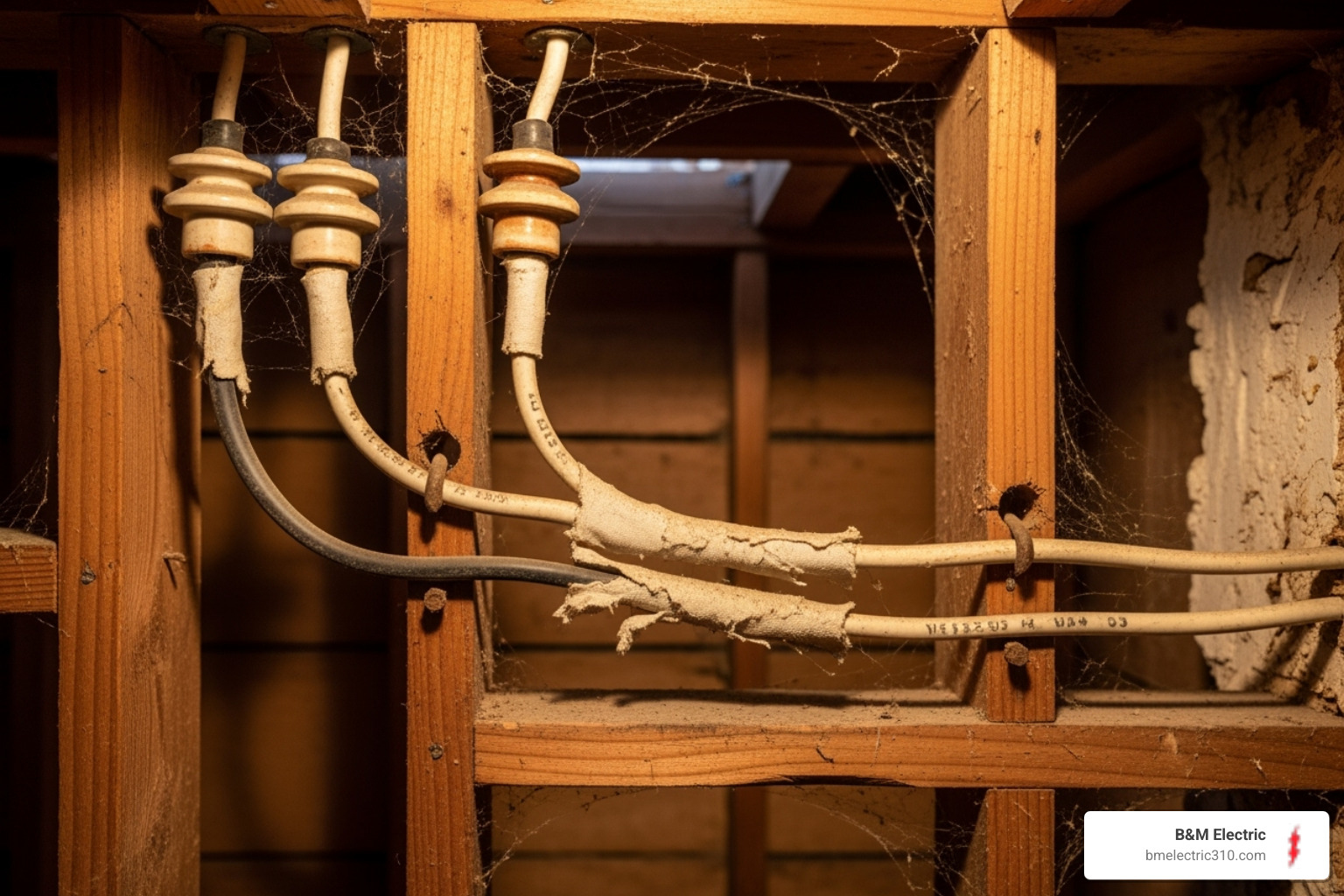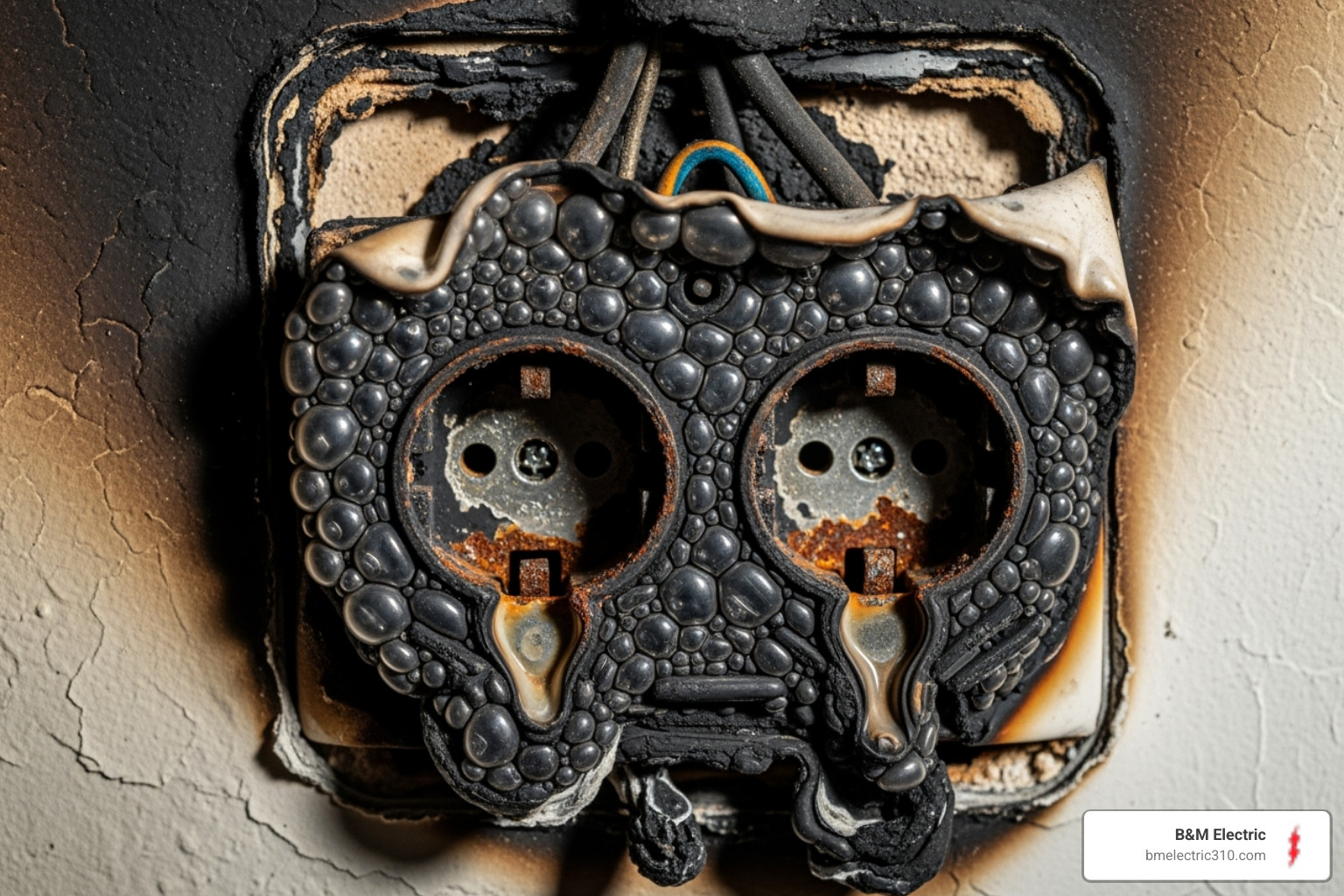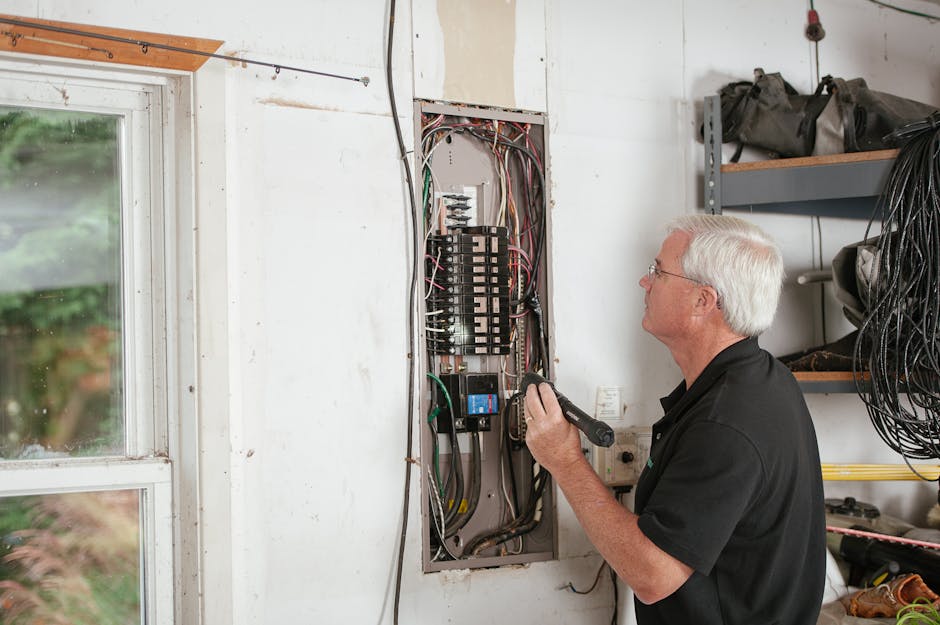Spotting Electrical Code Violations What You Need to Know
By B&M ElectricSeptember 24, 2025
Electrical code violation repair: 8 Critical Dangers
Why Electrical Code Violations Pose Hidden Dangers to Your Property
Electrical code violation repair is a critical service that addresses dangerous electrical conditions in homes and businesses. When installations fail to meet National Electrical Code (NEC) standards, they create severe risks of fire, electrocution, and property damage. Many property owners are unaware of the hazards lurking within their walls, from outdated wiring and overloaded circuits to missing GFCI protection and improper grounding.
As one industry expert noted, “frayed wiring, outdated panels, or improper installations are common culprits that could lead to fires, power failures, or even hefty penalties.” Ignoring these issues can lead to denied insurance claims, fines, reduced property values, and legal liability.
This guide will help you identify common electrical code violations, understand the professional repair process, and see why working with a licensed electrician is essential for safety and compliance. We’ll also cover proactive steps to maintain your electrical system and prevent future violations.
Understanding Electrical Codes and Compliance
Electrical codes are an invisible safety net protecting your property from electrical hazards. Understanding them is key to ensuring safety and compliance.
What Constitutes an Electrical Code Violation?
An electrical code violation is any part of your electrical system that fails to meet established safety standards, creating an unreasonable risk of injury or fire. This can range from an uncovered junction box to an improperly wired electrical panel. Even issues caused by poor workmanship, sometimes called “code complaints,” can become dangerous if ignored.
National and Local Electrical Codes
The National Electrical Code (NEC) is the benchmark for electrical safety in the U.S., adopted in over 98% of all areas. Published by the National Fire Protection Agency (NFPA), the NEC is updated every three years to incorporate new technologies and safety findings.
While the NEC provides a national framework, local jurisdictions like Torrance and the South Bay often add specific amendments. This is why electrical code violation repair must be handled by local professionals who understand these unique requirements to ensure your property passes inspection the first time.
Role of Inspectors and Property Owners
Electrical inspectors are responsible for identifying code violations and ensuring all work meets safety standards before a property can be occupied. If they find a problem, they issue a notice of violation detailing the issue and a deadline for correction.
As the property owner, you are ultimately responsible for ensuring compliance. This includes arranging for proper repairs and being liable for any injuries or damages caused by faulty electrical work on your property. Staying proactive with electrical safety protects your investment and everyone who enters your home or business. For more tips, see our guide on Essential Electrical Safety Tips.
Common Electrical Violations to Spot in Your Property
Behind your walls, hidden electrical hazards could be putting your property at risk. Knowing what to look for can help you identify problems before they become catastrophic. Here are some of the most common violations we find in Torrance and the South Bay.
Outdated Wiring Systems
Older homes may have knob-and-tube or aluminum wiring. Knob-and-tube wiring lacks a ground wire, essential for modern safety, and cannot handle today’s electrical loads. Aluminum wiring, used in the 1970s, can cause overheating and fire risks at connection points with copper wires. Both systems often require professional rewiring to meet current codes. Related issues can be found in Outdated Electrical Panels.
Circuit Overload
Flickering lights or frequent circuit breaker trips are signs of an overloaded circuit, a leading cause of house fires. This often happens when too many devices are plugged into a single circuit via power strips. Never replace a breaker with a larger one to solve this; it allows excessive current to flow through wires not designed to handle it, creating a serious fire hazard. Learn more about Frequent Circuit Breaker Trips.
Missing Safety Devices
Ground Fault Circuit Interrupters (GFCIs) and Arc-Fault Circuit Interrupters (AFCIs) are critical safety devices. GFCIs prevent electrocution in wet areas like kitchens and bathrooms by instantly cutting power when a fault is detected. AFCIs detect dangerous electrical arcs in wiring that can cause fires. Many older homes lack these protections, a serious code violation. Consider Upgrading to GFCI Outlets to improve safety.
Improper Grounding
A grounded electrical system provides a safe path for excess electricity, preventing shocks and fires. Improper grounding is a common, hidden danger, especially when old two-prong outlets are replaced with three-prong versions without adding a ground wire. This creates a false sense of security. For more on this topic, the NFPA explains the basics of grounding and bonding.
Insufficient Receptacles
A lack of outlets often leads to the overuse of extension cords and power strips, which are not designed for permanent use and can become fire hazards. The NEC has standards for outlet placement to prevent this dangerous workaround.
Exposed or Damaged Wiring
Frayed insulation, wires poking from walls, or electrical splices made outside of a required junction box are immediate shock and fire hazards. All electrical connections must be contained within a proper enclosure to prevent arcs from igniting nearby materials.
The Dangers and Consequences of Non-Compliance
Ignoring electrical code violations is a dangerous gamble. These silent threats can lead to devastating consequences for your safety, property, and finances.
Safety, Property, and Financial Risks
The most severe consequence is the threat to personal safety. Fire risk is significant, as faulty wiring is a leading cause of house fires. Electric shock is another serious danger, especially when grounding is improper or GFCI protection is missing in wet areas. These hazards can develop silently, posing a threat long before any signs are noticeable.
Beyond safety, uncorrected violations can cause significant property damage. Overloaded circuits can char wood framing and ignite materials within walls. The financial fallout is also steep. Property owners face legal liability and substantial fines for uncorrected violations. Furthermore, insurance companies may deny claims for fires caused by known code issues or even cancel your policy. When selling your property, violations finded during an inspection can delay sales and decrease property value.
Prompt electrical code violation repair is the only way to eliminate these risks. Recognizing problems early is key; be aware of the Electrical Warning Signs to Watch For.
The Professional Process for Electrical Code Violation Repair
Addressing electrical code violations requires a systematic approach to ensure your property is safe and compliant. At B&M Electric, we follow a professional process to resolve dangerous electrical conditions effectively.
The Path to Compliance
Our process for electrical code violation repair is designed for clarity and safety:
- Professional Inspection: A certified electrician conducts a thorough examination of your entire electrical system to identify all violations and their root causes. Proper Electrical Inspections Prevent Issues from escalating.
- Detailed Report & Correction Plan: You receive a clear report detailing each violation, the associated risks, and a strategic plan for repairs, prioritizing the most critical issues first.
- Permitting: We handle the entire permitting process with local Torrance and South Bay authorities to ensure all work is legally documented and compliant.
- Expert Repair Work: Our skilled electricians execute the repairs according to the plan, adhering to strict safety protocols and minimizing disruption to your routine.
- Final Inspection: A local code enforcement official conducts a final inspection to verify that all violations have been corrected and your system meets current safety standards.
Why You Need a Licensed Electrician
Attempting to fix code violations yourself is dangerous and can lead to further complications. Hiring a licensed electrician is essential for several reasons:
- Expertise and Safety: Professionals have the technical knowledge to diagnose and fix complex issues correctly and safely, following rigorous safety protocols.
- Local Code Knowledge: A licensed electrician is familiar with specific Torrance and South Bay codes, ensuring repairs pass inspection.
- Proper Tools: Professionals use specialized equipment for accurate diagnosis and safe, effective repairs.
- Liability Protection: Licensed and insured electricians carry coverage that protects you from liability if something goes wrong during the repair process.
For help finding the right professional, see our guide on Hiring Reliable Electrical Contractors. Our team ensures clear communication and a smooth process from the initial assessment to the final walkthrough, giving you confidence in your newly compliant electrical system.
Proactive Prevention and Ongoing Maintenance
Instead of waiting for electrical code violation repair to become an emergency, proactive maintenance can keep your system safe and efficient. A little prevention goes a long way in avoiding major problems.
Regular Electrical Inspections
Schedule routine inspections with a licensed electrician every few years to catch small issues before they become hazardous. A trained eye can spot warning signs like loose connections or overloaded circuits that you might miss. This investment provides peace of mind that your system is safe. Learn more in our guide, Electrical Maintenance Explained.
Upgrading Outdated Components
Electrical systems don’t improve with age. Outdated components like knob-and-tube or aluminum wiring were not designed for modern electrical demands and can be a safety hazard. Upgrading your electrical panel to a modern, energy-efficient model improves both safety and performance, eliminating issues like flickering lights or tripped breakers. If you see Signs You Need an Electrical Panel Upgrade, it’s time to take action.
Avoiding Risky DIY Electrical Work
While DIY projects can be rewarding, electrical work is not the place for it. One wrong move can create new code violations, cause a fire, or result in serious injury. Improper work will be flagged in future inspections and can cause insurance issues. Always leave electrical repairs to licensed professionals.
Educating Occupants on Safe Use
Simple awareness can prevent many common electrical problems. Teach family members or employees not to overload outlets, to avoid relying on extension cords as permanent solutions, and to recognize the signs of an electrical issue. An educated household or workforce is an extra line of defense against electrical hazards.
Frequently Asked Questions about Electrical Code Violation Repair
Property owners often have similar questions when facing electrical code violation repair. Here are answers to some of the most common concerns.
Can I fix minor electrical code violations myself?
It’s highly inadvisable. What appears to be a “minor” issue, like a loose outlet, can mask a more serious violation like improper wiring or missing grounding. The risks of DIY electrical work include fire hazards, legal liability, and making the problem worse. A licensed professional has the expertise to diagnose the root cause and ensure the fix is safe and compliant. As we explain in our article, hiring Professionals for Electrical Work Matters.
How often should I have my electrical system inspected?
For most homes, a comprehensive inspection every 3 to 5 years is recommended. However, you should consider more frequent inspections under certain conditions:
- Older Homes (50+ years): Annual inspections are wise, as old systems and components can deteriorate.
- After Major Renovations: Construction can disturb existing wiring, so an inspection is a smart precaution.
- When Buying a Property: A pre-purchase inspection can save you from inheriting costly and dangerous electrical problems.
Don’t wait for a scheduled inspection if you notice warning signs like flickering lights, warm outlets, or frequently tripping breakers. These require immediate attention. Learn more about the Importance of Electrical Inspections.
What happens if I receive a notice of violation from the city?
Don’t panic. A notice of violation is a formal warning designed to help you correct a problem before it becomes more dangerous. The notice will detail the specific violation and provide a deadline for compliance. It is crucial to act promptly, as ignoring the deadline can lead to fines and legal issues. Your best course of action is to contact a licensed electrician immediately. They can interpret the notice, develop a correction plan, and perform the necessary repairs to meet the inspector’s requirements, ensuring a smooth re-inspection process.
Conclusion: Ensure Your Property is Safe and Compliant
We’ve explored the hidden dangers of electrical code violations, from outdated wiring and overloaded circuits to improper grounding. These are not minor issues; they are serious threats that can lead to fires, electric shock, and significant financial consequences, including fines and denied insurance claims.
Compliance with electrical codes is about ensuring a safe environment for your family, employees, and tenants. It protects your property investment and provides invaluable peace of mind. When it comes to electrical code violation repair, the expertise of a licensed electrician is non-negotiable. They provide the knowledge, skill, and adherence to safety protocols necessary to transform a hazardous situation into a reliable, compliant system.
For 50 years, B&M Electric has been serving Torrance, CA, and the South Bay communities. We understand that electrical issues can be stressful, and we are committed to providing precise, careful service to make the process smooth. We don’t just fix violations; we help you prevent future problems.
Don’t gamble with your safety. If you’ve received a violation notice or suspect an issue, take the first step toward a safer property today.
Contact us for professional electrical repair services in Torrance and let our team restore your peace of mind.



